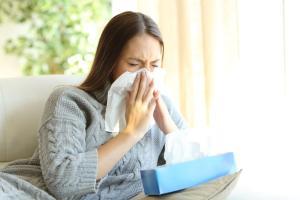Here are some common monsoon diseases and tips to tackle it

Representational picture
Monsoon provides you relief from the scorching heat. But, do you know that your immunity can go down during the rainy season? Every monsoon season, the risk of catching various diseases goes up due to unhygienic conditions and not adhering to basic preventive measures. Hence, early diagnosis and treatment is the key to keep these diseases away. Dr Prashant Borade, Head of Critical Care, Global Hospital, Mumbai lists out some common monsoon diseases and tips to tackle it.
ADVERTISEMENT
Dengue: According to the World Health Organization (WHO), dengue is a fast-emerging pandemic-prone viral disease in many parts of the world. It is a mosquito-borne viral infection causing severe flu-like illness and, sometimes causing a potentially lethal complication called severe dengue. One may exhibit symptoms like aching muscles and joints, body rash that can disappear and then reappear, high fever, headache, and pain behind the eyes, vomiting, and nausea. Your expert will prescribe you medications to deal with it. And to prevent it, reduce the amount of skin exposed by wearing long-sleeved clothes. Use mosquito repellents, traps and nets. The Aedes mosquito tends to breed in clean, stagnant water. Thus, turn buckets and watering cans over and store them under shelter so that water cannot accumulate and take out excess water from plant pot plates.
Malaria: It can be termed as a disease caused by a parasite. The parasite is transmitted to humans through the bites of infected mosquitoes. One suffering from malaria can experience symptoms like fever, chills, headache, nausea, and vomiting, muscle pain and fatigue, sweating, chest or abdominal pain, and cough. Take an antimalarial drug as a precautionary measure in mosquito-prone areas. To prevent it: Accumulation of dirty water must be kept in check to prevent mosquito breeding and avoid venturing out without wearing full-sleeved clothes.
Chikungunya: It is a virus that’s spread by mosquitoes. It can’t be passed from person to person. Symptoms usually begin 3–7 days after being bitten by an infected mosquito. Fever and joint pain, are the most common symptoms. Moreover, one will also experience headache, muscle pain, joint swelling, or rash. Your expert will assess you and then prescribe you the medication. To prevent it: Wear long sleeves and long pants. If you’re in a place with no air conditioning or screens in the windows, then use mosquito nets.
Jaundice: It is a term used to describe a yellowish tinge to the skin and the whites of the eye and the body fluids may also be yellow. It is caused by a buildup of bilirubin, which is a waste material, in the blood. An inflamed liver or obstructed bile duct can lead to jaundice and other underlying conditions too. One may show symptoms like a yellow tinge to the skin and whites of the eyes, dark urine, and itchiness. The treatment will depend on the underlying cause. To prevent it: It a healthy and a balanced diet to keep your liver in top shape. Limit your alcohol consumption, and exercise daily.
Gastroenteritis (stomach flu): It is an inflammation of the lining of the intestines caused by a virus, bacteria or parasites. It causes diarrhoea and vomiting. It's usually caused by a bacterial or viral tummy bug. Gastroenteritis and food poisoning are quite common during the monsoon season, and the high humidity helps in the growth of disease-causing bacteria. One may show symptoms like sudden, watery diarrhoea, feeling sick, vomiting, mild fever, poor appetite, upset stomach, aching limbs, and headache. The course of treatment is mainly to prevent dehydration, control fever. Antibiotics may be prescribed after the evaluation of the condition of the patient. To prevent it: Stay hydrated and opt for a healthy diet which includes curd and fruits like banana and apple. Avoid eating raw food like salads because it is difficult to ascertain whether they have been washed, cleaned and stored at the right temperature. Bid adieu to the roadside food which may be made in contaminated water and trigger diarrhoea by further worsening the condition.
Cholera: It is an infectious disease that causes severe watery diarrhoea, which can cause dehydration and even death if untreated. It is caused by eating food or drinking water contaminated with a bacterium called Vibrio cholerae. People may suffer from diarrhoea accompanied by vomiting, which can dehydrate them. Furthermore, dehydration can cause rapid heart rate, loss of skin elasticity, low blood pressure, thirst and muscle cramps. You must immediately consult your doctor if you have cholera. To prevent it: Drink boiled water, avoid drinking contaminated water and maintain proper hand hygiene and sanitation.
Typhoid: It is a bacterial infection that can lead to a high fever, diarrhoea, and vomiting and cause by the bacteria Salmonella typhi. The infection is passed on through contaminated food and drinking water, and it is more prevalent in places where hand washing is less frequent. It can also be passed on by carriers who do not know they carry the bacteria. Weakness, abdominal pain, constipation, and headaches are the symptoms of it. Your doctor may prescribe antibiotics. To prevent it: Opt for clean drinking water, proper sanitation, and good handwash hygiene. The takeaway message: Use separate hand towels to avoid the transmission of disease-causing bacteria. Cover your mouth and nose with a handkerchief while coughing or sneezing. Keep your garments dry to avoid fungal skin infections. Eat freshly prepared food and avoid eating out as much as possible during monsoon. Avoid visiting crowded places like theatres or exhibitions and use hand sanitisers regularly.
Catch up on all the latest Crime, National, International and Hatke news here. Also download the new mid-day Android and iOS apps to get latest updates
 Subscribe today by clicking the link and stay updated with the latest news!" Click here!
Subscribe today by clicking the link and stay updated with the latest news!" Click here!






